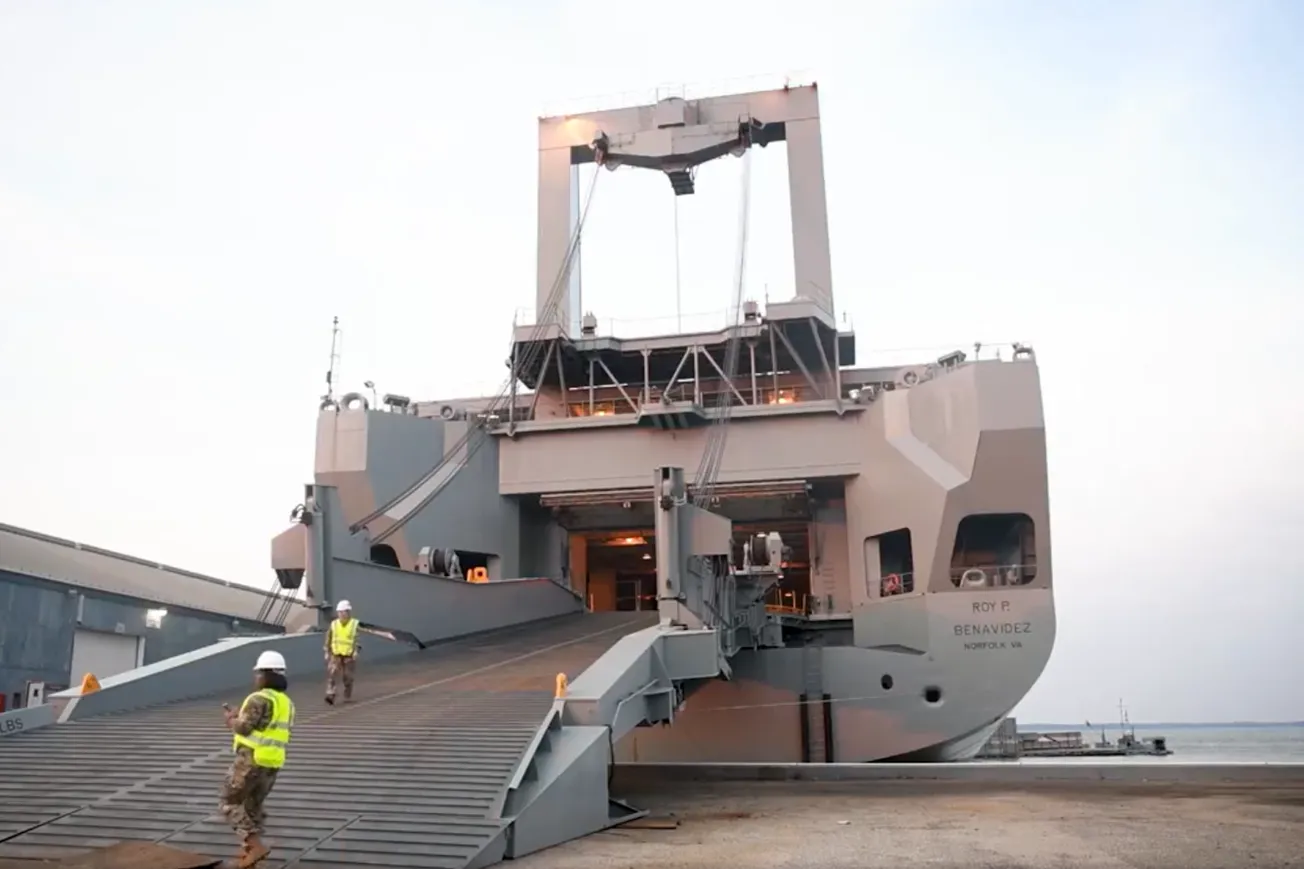By Micaela Burrow, The Daily Caller News Foundation | March 22, 2024
President Joe Biden’s plan for the U.S. military to construct an artificial port to deliver humanitarian aid to Gaza puts U.S. troops at risk for political reasons, experts told the Daily Caller News Foundation.
Biden announced during his State of the Union address on March 7 the U.S. military would employ an artificial dock and pier system to create a maritime aid corridor into Gaza as thousands of civilians are without food and medicine. However, key aspects of the plan remain undeveloped, including how the administration will ensure the safety of at least 1,000 U.S. troops involved in the mission, calling into question how deeply the administration thought through the plan before announcing it, experts told the DCNF.
“I think the administration is looking for a way to look like they’re increasing aid to Gaza, in some sense to placate their own domestic constituencies,” Michael DiMino, a fellow at the Defense Priorities think tank and former intelligence officer, told the DCNF. “It’s a terrible idea.”
Biden has weathered criticism from his left flank over his handling of the Israel-Hamas conflict.
In late February, more than 100,000 registered Democrats voted “uncommitted” in the Democratic Michigan primary as activists urged Democratic voters in the state, which is home to a large population of Muslims and Arab-Americans, to protest Biden’s support for Israel over the war in Gaza.
Critics say Biden is subsidizing Israel’s “genocide” of Palestinians and have called for a permanent ceasefire. Biden has not asked Israeli President Benjamin Netanyahu to halt operations against the Hamas terrorist group, but elements of his own party have called for more aggressive efforts to force more food, medicine and water into Gaza, The Associated Press reported.
“I think once … the primary was done in Michigan and turnout was lackluster, alarm bells were going off,” Robert Greenway, national security director at the Heritage Foundation, told the DCNF. Domestic political concerns are “absolutely” overruling the administration’s consideration for prudent military planning or Gaza’s humanitarian problems, Greenway added.
Less than 36 hours after Biden’s announcement, the Army’s 7th Transportation Brigade embarked on the U.S. Army Vessel (USAV) General Frank S. Besson for the Mediterranean, loaded with the first of the elements for the temporary pier, CENTCOM said. The Besson and other Army ships — Logistics Support Vessel James A. Loux and Landing Craft Utility Wilson Wharf, Matamoros and Monterrey — are currently making slow but steady progress across the Atlantic.
Once they arrive in coastal waters off the narrow Gaza strip, it will take roughly another month to build the artificial port and causeway, Pentagon Press Secretary Maj. Gen. Pat Ryder explained. He reiterated Biden’s assurance no U.S. troops will set foot in Gaza.
Experts said the plan appears rushed, leaving questions that should be answered already regarding security for U.S. and NGO personnel and the logistics of aid distribution without putting American boots on the ground.
U.S. troops will be working on ships just a few thousand feet from shore and well within the range of Hamas missiles, Greenway said.
“I don’t want to get into you know, potential vulnerabilities. Obviously a complex operation here, all the things that we’re going to work through. I think the key aspect here is that again we’re working alongside partners and allies in the region, as well as NGOs to help implement this,” Ryder said on March 8.
The plan’s rapid conception caught some military officials by surprise, NBC reported, citing three U.S. military officials. As far as is known, the military does not have a plan for security of U.S. forces and aid deliveries to the active war zone.
Moreover, a host of things could go wrong. Potential Israel Defense Forces (IDF) presence to provide security invites Hamas attacks, with U.S. troops, NGO personnel and civilians caught in the crossfire. Hungry civilians could swarm the causeway, inviting a forceful response to stem the chaos.
Lawmakers from both sides of the isle have voiced concerns over whether the plan will actually accomplish the goals of alleviating the humanitarian situation verging on crisis, Politico reported.
The Biden administration reportedly expects Israel to provide perimeter security and reduce military operations near the beachhead, according to NBC. Israel will also inspect aid in Cyprus before it is transported to the dock, and there might be a second inspection before being loaded onto small Army boats for transportation to the pier.
Israeli officials have suggested hiring contractors to patrol the beaches and distribution nodes, and getting other countries to foot the bill, NBC News reported, citing one former and two current U.S. officials.
“What ends up typically happening in conflict zones is you go to whoever is in charge and you make an agreement, or you pay someone to make an agreement with whoever is in charge. The results of that are almost inevitably bad,” Greenway said.
“Until Hamas is gone, there is no security plan because as long as Hamas is there, they’re firing rockets, small arms, etc.,” the operation is in danger, he added.
The infrastructure, termed Joint Logistics Over-The-Shore (JLOTS) by the Pentagon, involves two components: an 1,800-foot building-block floating causeway reaching from the shore to a trident-shaped pier, and a separate floating dock composed of steel segments anchored further offshore, officials have explained.
Cargo ships will offload aid pallets to the dock, where they will be inspected and transferred to smaller ships, including logistics support vessels, or LSVs, and ferried to the trident pier.
As of March 18, Army, Navy and civilian personnel were working around the clock to load sections of the causeway and construction equipment onto the MV Roy A. Benavidez, a cargo ship part of the U.S.’ ready reserve fleet operated by the Maritime Administration (DOTMARAD), USNI News reported. The Navy is also sending its Naval Beach Group 1 to help the Army’s 7th Transportation Brigade. An overall military commander for the operation was still undetermined.
The National Security Council and the Pentagon did not respond to the DCNF’s request for comment.
An Israeli government spokesperson declined to comment. The IDF referred the DCNF to the government offices.
The plan has other holes, too, according to experts and media reports. It remains unclear how the aid will be offloaded from the trident pier onto the beach without American soldiers stepping foot on Gaza’s shores, or how the pier will be anchored to the shore in the first place. No one has decided on a solution for aid distribution that ideally avoids scenarios like that of Feb. 29, when civilians mobbed an aid truck and spooked the IDF into firing in response, or how to prevent Hamas from confiscating the supplies.
“[The U.S. military] will not have anything to do with that,” a defense official told the DCNF, referring to on-shore activities.
#DYK, JLOTS systems can jointly employ Army and Navy logistics assets to deliver critical supplies to troops or civilians in austere environments anywhere in the world.#SurfaceWarriors | @CENTCOM | @usarmycentral pic.twitter.com/hla6NUTfD9
— SDDC (@hqSDDC) March 18, 2024
“All these other problems are so severe to me that it’s not worth the risk, which is why it is disappointing that the administration is putting politics ahead of sound military and intelligence planning,” DiMino told the DCNF.
The defense official denied that the Biden administration rushed the plan to build the pier.
“No, we were working on this — when we started doing humanitarian airdrops, there was direction from the president of finding ways” to increase aid flow into Gaza, the official told the DCNF. Airdrops began in early March, but “conversations were starting earlier than that,” the official added.
U.S. airdrops have delivered between 15,000 and 40,000 meals at a time.
“This was fairly last minute — the administration was looking for a Goldilocks approach that would allow them not to have to put more pressure on Israel, or put more pressure on Egypt, but to work around the bigger issue here,” DiMino said.
The Biden administration has labeled Israeli President Benjamin Netanyahu’s intention to conduct a ground attack near Rafah a “mistake.”
If all goes as promised, the pier could increase humanitarian aid deliveries into Gaza far beyond the 100 to 200 truckloads entering through the Rafah land route from Egypt. Ryder said the Pentagon expected the pier to become operational mid-May and facilitate the delivery of up to 2 million meals per day.
“We know the best options are through the land routes, but aid right now is not getting in through the land crossing. There are people starving right now,” the defense official said.
Experts also questioned whether the pier was necessary at all.
Israel could control the delivery of seaborne aid the same way it meters truck deliveries into Gaza, Hudson Institute senior defense fellow Tim Walton pointed out to the DCNF. That would place the administration in a similar position to where it is now, frustrated with the Israeli government for curtailing the flow of humanitarian supplies through the southern land entry.
“Although US military and Merchant Marine personnel will do their best to accomplish the tasked missions, neither the airdrop nor maritime delivery of aid appears likely to influence Israel to increase the acceptance of humanitarian relief over land routes,” Walton said.
“What has changed to give us confidence that the aid that we’re providing and the effort we’re expending to deal with it is both needed and is going to get to the people that need it? And the answer to both questions is there isn’t a plan to do it, and there isn’t an answer,” Greenway said.
Original article link
Related: Efforts Continue To Deliver Aid Routes Into Gaza - Infographics









